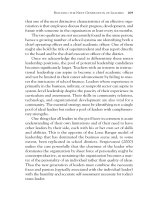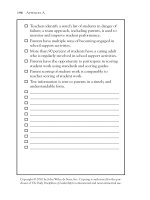How to improve our spoken English
Bạn đang xem bản rút gọn của tài liệu. Xem và tải ngay bản đầy đủ của tài liệu tại đây (134.11 KB, 9 trang )
<span class='text_page_counter'>(1)</span>HOW TO BE A GOOD LANGUAGE LEARNER 1. Always go to class. 2. Get to class early. 3. Sit in the middle of the front row. 4. Sit up straight and pay attention. 5. Ask and answer questions. 6. Study every day. Don’t cram. 7. Learn something new every day. 8. Do all homework assignments and submit them on time. 9. Use your new language outside of the classroom at least once every day. 10. Don’t quit, no matter what!. INTRODUCTORY UNIT. REQUESTS FOR THE STUDENT: ASKING FOR HELP. Here are some formulas for asking for help: Introducing the formulas - Sorry, - Excuse me, - Pardon me, Formulas - Can you speak more slowly, please? - I don’t understand. - Could you repeat that, please? - Could you explain “request”? - What does “greeting” mean? - What’s (…) in English? - How do you say (…) in English? - How do you spell that? - How do you pronounce this word? - I don’t know. - I don’t remember. HOW CAN I IMPROVE MY SPOKEN ENGLISH? Some people are shy to speak a new language with others. This shyness is mostly associated with the fear that “I will make mistakes.” If you are shy to speak English with other people, read the following. Use a sound recorder to work on your pronunciation. All computers now include a sound recording device. Read out words to the sound recorder, listen to your pronunciation, and repeat the word, phrase or sentence until you get better. See pronunciation video lessons. -. Every day, read aloud to yourself / yourselves a piece of text, news or anything of interest.. Study a conversation. Role-play with someone using the conversation lesson. If you don’t have anybody to role-play with, then use a mirror. Speak aloud looking into the mirror. -. Learn something every day in English. Do things you like. Then talk about them in English.. Do the following exercise before the mirror. Imagine each line first and then say it aloud looking into the mirror: “I don’t fear about making mistakes when I speak English. I am doing a good job when I speak English with others. I tolerate my mistakes. I am learning English. I appreciate my efforts. I am improving my English with my efforts and good work. People like me because I am nice to talk with. People speak with me because of my good qualities as a person. They don’t mind if I slip at times because English is not my mother tongue. I am learning and improving it every day. I am powerful. I have all the power to feel good about my English. No one can make me feel bad about it. I make mistakes only to learn from my mistakes”.
<span class='text_page_counter'>(2)</span> UNIT 1 1. Tom: Mary: Tom: Mary: Tom: 2. Sue: Jane: Sue: Jane: Sue: 3. John: Linda: John: Linda: John: 4. Anna: Rose: Anna: Rose: 5. Chip: Sarah: Chip: Sarah: Chip: Sarah: Chip: Sarah: Chip: Sarah: Chip: 6. Ann: Wendy: Ann: Wendy: Ann: Wendy: Ann: Wendy: Ann: 7. Andy: Scott: Andy: Scott: Andy: Scott: Andy: Scott: Andy: Scott: Andy: Scott: 8. Jack: Bill: Jack: Bill: Jack: Bill: Jack: Bill: Jack: Bill: Jack: Bill:. GREETINGS Good morning, Mary! Lovely morning, isn’t it? Morning, Tom! Yes, it’s nice. How are you? Fine, thanks. And you? Fine. Hi, Jane! Aren’t you going to work today? Yes, but I’m going to work later. I have an appointment at the dentist’s. How are you doing? I’m OK, thank you. And you? I’m very well, thanks. Morning, Linda! How are you? Morning, John! I’m fine, thanks, John! And you? I’m very well, thanks. I’ve just been on holiday. How was it? It was good. Thanks. Rose! Great to see you again. Great to see you. How are you doing? OK! Hello, I’m Chip. Hello, I’m Sarah. Pleased to meet you, Sarah. Pleased to meet you, too. Where are you from? I’m from London. And you? I’m from Bangkok. What do you do? I’m a dentist. Oh, that’s interesting. I’m a dentist, too. Dentistry is very interesting, isn’t it? Yes, I think so. Hello, I’m Ann. Hello, I’m Wendy. Nice to meet you, Wendy. Nice to meet you, too. How are things? Pretty good. Thank you. And how are you? Not too bad. Thanks. Sorry, I must be off. See you later. See you later, too. Hello, Scott! Hello, Andy! How’s it going? I’m very well, thank you. And you? I’m fine, thanks. Are you free tonight? Yes, I am. Would you like to go to the cinema tonight? Yes, I’d love to. Where and when shall we meet? Let’s meet at my house at about 6 p.m. Sure. See you then. Bye. How are you, Bill? I’m fine, thank you. And you? Fine, too. Where are you going? I’m going to the post office. And you? I’m going to the department store. Are you in a hurry? No, not really. What have you been doing lately? Oh, nothing much. I’m just taking one day at a time. That’s OK. Everybody else does, too. See you later. See you later, too..
<span class='text_page_counter'>(3)</span> and and you?. USEFUL EXPRESSIONS. You say and you? in reply to someone who has asked you how you are: Example 1: Mary: I haven’t seen you for a long time, Jane. How are you? Jane: I’m very well, thanks, Mary. And you? Example 2: John: Good morning, Tom! How are you? Tom: I’m fine, John. And you?. are how are you?. You say how are you? as a conventional greeting to ask about someone’s health and happiness, whether or not you have any reason to believe that they have been ill or unhappy and whether or not you really want to know how they are: Example 1: Mike: Hello, James. How are you this morning? James: I’m fine, thanks, Mike. How are you? Example 2: Peter: Tom told me that you had to go to hospital last week, Jane. How are you now? Jane: I’m fine, thanks, Peter. I was just having a small operation and I’ve recovered completely. You can say how are you? or and how are you? instead: Example: Ann: Hello, Jill. How are you today? Jill: I’m fine, thanks. And how are you?. do how are you doing?. This is an informal expression meaning the same as how are you?: Hello, Mike! I haven’t seen you since Christmas. How are you doing? Hi, Jim! I haven’t seen you for a long time. How are you doing? Two other informal expressions with the same meanings are how’s it going? and how are things?: + Hi, Jack! How’s it going? + Hi, Sarah! How are things? + +. fine I’m fine You say I’m fine in reply to someone who has asked how you are. Even if you are not really feeling fine, it is conventional to say that you are, rather than to tell someone what is wrong with you. The expression is often shortened to fine: + Good morning, Jean! How are you? I’m fine, thank you, Mary. How are you? + Hi, Ben! How are you? Fine, thanks, Peter. And how are you? You say I’m very well and I’m OK in the same way, but I’m OK is more informal: + Good morning, Jill! How are you today? I’m very well, thank you, Mary. How are you? + Hi, Bill! How are you? I’m OK, thanks. And you? hello! You use hello! as a conventional greeting when you meet someone: + Hello, Jane! Where are you going in such a hurry? + Hello, Mary! I’m sorry, I’m late. You also say hello! when you answer the phone: + Hello! This is Jane Brown speaking. You also say hello! to the person who answers the phone when you are making a phone call: + Hello! I’d like to speak to the manager, please..
<span class='text_page_counter'>(4)</span> hi! You use hi! as an informal alternative to hello! when you meet someone: + Hi, Tom! How are you doing? + Hi, Lucy! I haven’t seen you for ages. morning good morning You say good morning to someone as a greeting when you meet them in the morning. This is often shortened to morning! + Good morning, Mr. Brown. I’m just off to the newsagent to get my newspaper. + Morning, Lucy! I can’t stop to chat because I’m already late. evening good evening You say good evening to someone as a greeting when you meet them in the evening. This is often shortened to evening!: + Good evening, Jim! Have you just finished work? + Evening, Jack! You’re on a later train than usual. UNIT 2 MAKING INTRODUCTIONS Introducing yourself Shake hands firmly, and look at the other person straight in the eye. Smile! Men shake hands with men. Women choose whether to shake hands with men or not. The woman offers her hand first. Nowadays women often shake hands with women (but not always). Say how do you do. In the USA the response is pleased to meet you or fine, thanks. In Britain, the response is usually how do you do. Give information about yourself. State your name. Add extra information (job, company or where you live). Exchange business cards. Introducing other people Introduce in the correct order. Introduce lower status to higher status. Introduce younger people to older people. Introduce men to women. +. Meg: Good morning! My name’s Meg Wilson. I’m from the Blackford branch of the firm and I’m here to do some training. Mr. Black is expecting me. Receptionist: Good morning, Meg! I’ll just let Mr. Black know you’re here. Secretary: Good morning! You must be Meg Wilson. I’m Sarah Smith and I’m Mr. Black’s secretary. Welcome to head office. Meg: Thank you! I’m really looking forward to working here. Secretary: Mr. Black, this is Meg Wilson from our Blackford office. Mr. Black: How do you do, Meg? I hope you will enjoy your visit to head office. Meg: How do you do, Mr. Black? I’m sure I will. Mr. Black: Well, start by getting Sarah to introduce you to some of the other people you will be working with. Secretary: Good morning, everyone! I’d like to introduce Meg Wilson. She’s from Blackford office and she’s going to be working with us for a couple of weeks. I think Mr. Black told you about her. Jim: Hello, Meg! Pleased to meet you! I hope you enjoy your time here. Mike: Hi, Meg! Nice to meet you! Mary: Hi, Meg! Good to meet you! Let me know if I can do anything to help. Meg: I’ll never remember any of their names..
<span class='text_page_counter'>(5)</span> +. A: B: A: B: A: C: B: A: B:. +. A: Hi, Jack. How are you? B: Fine, thank you. I’d like you to meet my roommate, Jim. A: Nice to meet you, Jim. C: Me, too. Are you studying at this university? A: Yes, I’m studying Physics here. C: Are you living here with your family? A: No, my family is in China. C: How long have you been living here? A: Two months. C: You speak English very well. A: Sometimes I make mistakes when I speak English, and I have trouble with my pronunciation, too. C: Well, it’s almost time for class. See you later. A: See you later, too.. +. A: B: A: C: B: C: B: C: B: C: B: C: B:. + + +. OK. How do you do. My name is Tarzan, and I believe you are known as Jane. Allow me to introduce myself. I am John, manager of BBC Company. My name is Linda. I’m from Mexico City, and I’m a lawyer. I’m married and I have two wonderful children. In my free time I like to play tennis and go the movies. My name is Kenji Suzuki. I’m an English teacher, and I teach in a large high school. I live in Osaka with my wife and son, Ichiro. I’m a big baseball fan, and I love to play golf. My name is Wilma Jane. I’m from Spain, and I’m a model. I work for a large international modeling agency. I’m single, but I have a very nice boyfriend, Roger. I like to go dancing, and, of course, I love to go to the beach. Hi, there! My name’s Gloria Gusto. I’m an actress. I’m from London. I’ve got a flat in London and a house in Hollywood, with a swimming pool. I’ve got a new Rolls-Royce and a lot of money in the bank. I’ve got a husband, and three wonderful children in Hollywood. Life’s great! I’ve got everything! Hello, my name’s Tom Atkins. I’m from London, too. I’m broke. I haven’t got any money. I haven’t got a job or a house, or a car. I haven’t got a wife, and I haven’t got any children. Life’s terrible! I haven’t got anything!. + + +. +. Good evening, Mr. Zhen. Good evening, Mr. White. Have you met my wife, Judy? No, I haven’t had the pleasure. Allow me to introduce my wife to you. Mr. Zhen, this is my wife, Judy. How do you do, Mr. Zhen? How do you do, Judy? Have a glass of brandy and let me introduce you to some of my friends. Thank you.. Jack, Have you met Bill? No, I haven’t. Then let me introduce you to him right now. Jack, this is my friend, Bill. Hi, Jack. I’m glad to meet you. I’m glad to meet you, too. Can we sit down somewhere and have a talk? Sure. Let’s sit over there. I’ve heard about you, but I haven’t had the chance to meet you This is a very pleasant occasion, isn’t it? You have a good reputation, too. What company are you working for? I’m working for the Bank of America. And what about you? I’m a lawyer. I hope we’ll be good friends. I hope so..
<span class='text_page_counter'>(6)</span> USEFUL EXPRESSIONS how how do you do You say how do you do? as a formal way of responding when you are introduced to someone: + Mr. Brown, I’d like to introduce you to Miss Jones, who is in charge of publicity. How do you do, Miss Jones? How do you do, Mr. Brown? Please not that you do not reply to the question how do you do? It is simply a conventional greeting requiring no answer and should not be treated like such expressions as how are you? I’m … You use I’m … or I am …when you are telling someone or some people who you are, often adding some other information, such as what you do: + Hello, everyone! I’m John. I’ve just moved here from London. + Good morning, children! I am Miss Brown, and I am going to be your teacher this semester. You also use my name is … in the same way: + My name is Jack. I’m the new hotel porter. My name is Frank Brown. I’m here to help you with the garden. pleased pleased to meet you You use pleased to meet you as a rather informal conventional response to being introduced to someone. Formerly, the expression was considered not very acceptable, and even rather vulgar, but social manners have changed and it is now considered quite acceptable. It is much less formal than how do you do?. There are various alternative forms of this expression including good to meet you and nice to meet you: + This is Jean Smith, my roommate. Nice to meet you, Jean! + This is John Black, everyone. He is one of our new salesmen. Good to meet you! introduce I’d like to introduce … You use I’d like to introduce … in a fairly formal context when people are meeting each other for the first time and you are saying what the name of one of them is: + Father, I’d like to introduce you to George Burns. He is my new business partner. + Mr. Jackson, I’d like to introduce you to the new department secretary, Miss Lee. You can use may I introduce …?, let me introduce …and allow me to introduce … in the same rather informal way: + Grandfather, may I introduce you to John Wilson, who is one of my fellow teachers? + Mr. Wilson, let me introduce Mrs. Smith, who is our new biology teacher. this this is … You use this is … as a less formal way of saying I’d like to introduce …with the same meaning: + Jane, this is James, my new friend from university. + Peter, this is Lucy. She’s staying with me for a few days. + +. Sometimes people use meet … as an informal introduction in stead of this is …: Jack, meet Lucy. Also, some people simply use the names of the two people being introduced: Meg, Bob. Bob, Meg..
<span class='text_page_counter'>(7)</span> SPEAK ENGLISH LIKE AN AMERICAN If you already speak some English and now would like to speak more like a native, you've found the right book. One of the keys to speaking like a native is the ability to use and understand casual expressions, or idioms. American English is full of idioms. You won't learn these expressions in a standard textbook. But you will hear them all the time in everyday conversations. You'll also meet them in books, newspapers, magazines, and so forth. This book will help you understand and use idioms better. It contains over 300 of today's most common idioms. Idioms add color to the language. Mastering idioms and your speech will be less awkward, less foreign. You'll also understand more of what you read and hear. Often a student of English tries to translate idioms word-for-word, or literally. If you do this, you can end up asking, "What could this possibly mean?" This is why idioms are difficult: they work as groups of words, not as individual words. If you translate each word on its own, you'll miss the meaning and in many cases end up with nonsense. As an example, let's take one of the idioms presented in this book: "out of this world." This expression is often used to describe delicious food. If you have a party and you serve a delicious chicken dish, your American friend might tell you, "This chicken is out of this world!" Start translating the expression word-forword and you'll have to ask yourself: "What world is it in?" and "Why is she even commenting on the chicken being in a world, any world?" Here's another example. Let's say you're on a tennis team. Your team has won every single game for the past six months. You could tell your friend this without using an idiom: "Our team is lucky because we keep winning game after game." You can also express this with an idiom: "Our team is on a winning streak." It sounds better, doesn't it? When using idioms, remember that their word order and structure are often not flexible. In other words, you will need to get the word order exactly right. Here's an example of what I mean. Recently, I helped a student with his English homework. He then told me, "You've got a golden heart." He was trying to speak idiomatic English, but the correct expression is: "You've got a heart of gold." This book includes a CD of all of the dialogues. The CD will help you with pronunciation and will also help you remember the idioms. Play it at home, at work, in the car, while traveling...before you know it, you'll be speaking English like an American! Try to "develop an ear" for idioms on your own. Don't worry, I'm not suggesting you try to grow a third ear! "Develop an ear" is an idiom — it means to learn to listen for something. If you don't know what an expression means, ask a native speaker of English. Here's what you can say to your helper: Excuse me, I ran across this expression and I'm not sure what it means. Can you please help me out? Add idioms to your speech and writing just as you add vocabulary. You may find it helpful to write all of the expressions in this book down on note-cards and review them whenever you have a free moment. Good luck adding idioms to your everyday speech. It's fun, and you'll enjoy speaking English much more. Like an American! B O B ' S D A Y A T WORK Bob works as a manager in a furniture store. Peter, his boss, is not happy about sales. Bob's new advertising campaign hasn't helped. Peter decides to fire him. Peter: Bob: Peter: Bob: Peter: Bob: Peter: Bob: Peter: Bob: Peter:. Bob, I hate to break the news, but our sales were down again last month. Down again, Peter? Yeah. These days, everybody's shopping at our competition, Honest Abe's Furniture Store. But everything in there costs an arm and a leg! That's true. They do charge top dollar. And their salespeople are very strange. They really give me the creeps! Well, they must be doing something right over there. Meanwhile, we're about to go belly-up. I'm sorry to hear that. I thought my new advertising campaign would save the day. Let's face it: your advertising campaign was a real flop. Well then I'll go back to the drawing board. It's too late for that. You're fired!.
<span class='text_page_counter'>(8)</span> Bob: What? You're giving me the ax? Peter: Yes. I've already found a new manager. She's as sharp as a tack. Bob: Can't we even talk this over? After all, I've been working here for 10 years! Peter: There's no point in arguing, Bob. I've already made up my mind. Bob: Oh well, at least I won't have to put up with your nonsense anymore! Good-bye to you and good-bye to this dead-end job. Peter: Please leave before I lose my temper! about to - ready to; on the verge of EXAMPLE 1: It's a good thing Bob left the furniture store when he did. Peter was so angry, he was about to throw a dining room chair at him. EXAMPLE 2: I'm glad you're finally home. I was just about to have dinner without you. after all - despite everything; when everything has been considered; the fact is EXAMPLE 1: You'd better invite Ed to your party. After all, he's a good friend. EXAMPLE 2: It doesn't matter what your boss thinks of you. After all, you're going to quit your job anyway. at least - anyway; the good thing is that... EXAMPLE 1: We've run out of coffee, but at least we still have tea. EXAMPLE 2: Tracy can't afford to buy a car, but at least she has a good bicycle. NOTE: The second definition of this phrase is "no less than": There were at least 300 people waiting in line to buy concert tickets. (to) break the news - to make something known EXAMPLE 1: Samantha and Michael are getting married, but they haven't yet broken the news to their parents. EXAMPLE 2: You'd better break the news to your father carefully. After all, you don't want him to have a heart attack! (to) cost an arm and a leg - to be very expensive EXAMPLE 1: A college education in America costs an arm and a leg. EXAMPLE 2: All of the furniture at Honest Abe's costs an arm and a leg! dead-end job - a job that won't lead to anything else EXAMPLE 1: Diane realized that working as a cashier was a dead-end job. EXAMPLE 2: Jim worked many dead-end jobs before finally deciding to start his own business. (let's) face it - accept a difficult reality EXAMPLE 1: Let's face it, if Ted spent more time studying, he wouldn't be failing so many of his classes! EXAMPLE 2: Let's face it, if you don't have a college degree, it can be difficult to find a high-paying job. (to) give one the creeps - to create a feeling of disgust or horror EXAMPLE 1: Ted's friend Matt has seven earrings in each ear and an "I Love Mom" tattoo on his arm. He really gives Nicole the creeps. EXAMPLE 2: There was a strange man following me around the grocery store. He was giving me the creeps! (to) go back to the drawing board - to start a task over because the last try failed; to start again from the beginning EXAMPLE 1: Frank's new business failed, so he had to go back to the drawing board. EXAMPLE 2: The president didn't agree with our new ideas for the company, so we had to go back to the drawing board. (to) go belly-up - to go bankrupt EXAMPLE 1: Many people lost their jobs when Enron went belly-up. EXAMPLE 2: My company lost $3 million last year. We might go belly-up. (to) give someone the ax - to fire someone EXAMPLE 1: Mary used to talk to her friends on the phone all day at work, until one day her boss finally gave her the ax. EXAMPLE 2: Poor Paul! He was given the ax two days before Christmas. (to) lose one's temper - to become very angry EXAMPLE 1: Bob always loses his temper when his kids start talking on the telephone during dinner. EXAMPLE 2: When Ted handed in his essay two weeks late, his teacher really lost her temper. (to) make up one's mind - to reach a decision; to decide EXAMPLE 1: Stephanie couldn't make up her mind whether to attend Harvard or Stanford. Finally, she chose Stanford..
<span class='text_page_counter'>(9)</span> EXAMPLE 2: Do you want an omelet or fried eggs? You'll need to make up your mind quickly because the waitress is coming. no point in - no reason to; it's not worth (doing something) EXAMPLE 1: There's no point in worrying about things you can't change. EXAMPLE 2: There's no point in going on a picnic if it's going to rain. (to) put up with - to endure without complaint EXAMPLE 1: For many years, Barbara put up with her husband's annoying behavior. Finally, she decided to leave him. EXAMPLE 2: I don't know how Len puts up with his mean boss every day. real flop or flop - a failure EXAMPLE 1: The Broadway play closed after just 4 days - it was a real flop! EXAMPLE 2: The company was in trouble after its new product flopped. (to) save the day - to prevent a disaster or misfortune EXAMPLE 1: The Christmas tree was on fire, but Ted threw water on it and saved the day. EXAMPLE 2: We forgot to buy champagne for our New Year's party, but Sonia brought some and really saved the day! (as) sharp as a tack - very intelligent EXAMPLE 1: Jay scored 100% on his science test. He's as sharp as a tack. EXAMPLE 2: Anna got a scholarship to Yale. She's as sharp as a tack. (to) talk over - to discuss EXAMPLE 1: Dave and I spent hours talking over the details of the plan. EXAMPLE 2: Before you make any big decisions, give me a call and we'll talk things over. top dollar - the highest end of a price range; a lot of money EXAMPLE 1: Nicole paid top dollar for a shirt at Banana Republic. EXAMPLE 2: Wait until those jeans go on sale. Why pay top dollar?.
<span class='text_page_counter'>(10)</span>









